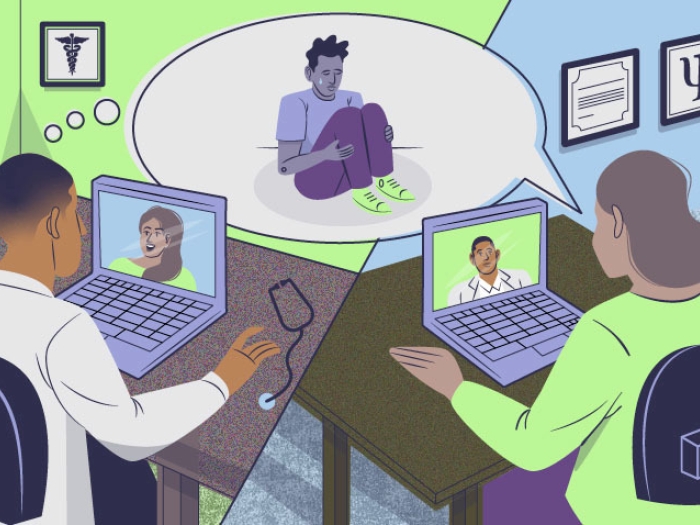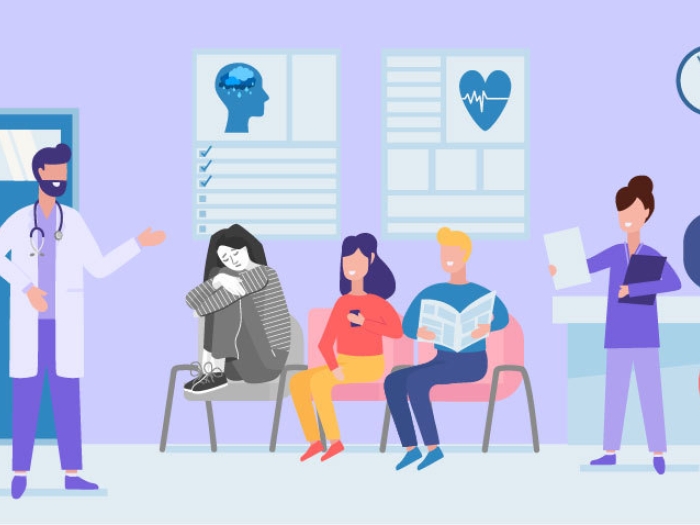Therapist- and computer-led alcohol interventions held in the emergency department also can reduce teenage dating violence perpetration and depression symptoms, a new study finds.
1:00 PM
Author |

One in 10 youth experience dating violence. They've been purposely hit, slapped or hurt while in a relationship — actions that can impart long-lasting effects on the victim.
LISTEN UP: Add the new Michigan Medicine News Break to your Alexa-enabled device, or subscribe to our daily audio updates on iTunes, Google Play and Stitcher.
But just one session of a behavioral intervention held in the emergency department to reduce underage drinking also significantly reduced dating violence perpetration and depression symptoms.
"Dating violence is a significant concern for many teens," says Quyen Ngo, Ph.D., LP, a research assistant professor at the University of Michigan Injury Prevention Center. "It is a time in their lives when they are establishing long-term patterns for their future, and it's important to intervene."
In a study published in the journal Pediatrics, Ngo and her team found that participants had a 47 percent lower rate of self-reported dating violence perpetration 12 months after a therapist-based intervention compared with those who did not receive one.
The rate of depressive symptoms was 15 percent lower at three months post-intervention among those who received the therapist intervention compared with the control group.
A different group of participants who had a computer-based intervention reported a 48 percent lower rate of dating violence perpetration six months after receiving the intervention compared with those without an intervention, the study found. Among those in the computer-based program, the rate of depressive symptoms was 22 percent lower versus those in the control.
"I was delighted and surprised that we were seeing these positive effects after the behavioral intervention. To have those effects one year after a brief computer-assisted alcohol intervention is promising," says Ngo, the paper's lead author.
Ngo is a career development awardee funded by the National Institute of Alcohol Abuse and Alcoholism, which also funded the study. She worked with principal investigators Maureen Walton, Ph.D., MPH, of the Michigan Medicine Department of Psychiatry, and Rebecca Cunningham, M.D., of the Michigan Medicine Department of Emergency Medicine.
'A turning point'
The in-person and computer interventions both were conducted in the same place: the emergency department at Michigan Medicine.
That setting was intentional: "In a stressful situation in an emergency room, kids may be more open to thinking about what they want for themselves," says Ngo, also a clinical psychologist. "The screening was a brief time, a moment of self-reflection, when they were encouraged to think about what's important in their lives as well as their risky drinking and its consequences … dating violence and depression symptoms.
"The intervention could have signaled a turning point for their lives."
MORE FROM THE LAB: Subscribe to our weekly newsletter
The motivational interview was designed to be nonjudgmental and empathetic, and it focused on drinking behaviors in a way that encouraged youth to be thoughtful about their actions. Questions were deliberately phrased as behaviors, not judgments — asking, for example: "Have you ever pushed or slapped your partner?" rather than "Have you ever been abusive?"
By addressing indecision, resistance and low confidence, the interviews supported teens as they found internal motivation to change difficult behaviors. An interactive approach helped teens to identify their goals and determine if drinking and dating violence were consistent with achieving those goals.
That appeared to help make a connection and glean insight.
"Youth are hungry for interaction that is nonjudgmental," Ngo says. "They are willing to talk if you have an open heart. They'll tell you all sorts of things if they feel you truly want to help them."
And each case, she knows, is different.
"In terms of dating aggression, there are a lot of reasons why youth get into conflicts that escalate and become physical," Ngo says. "It could be jealously, rumors or just having a bad day. It's important to treat aggressors with empathy."
Potential for wider use
Teens monitored in the Pediatrics study came to a hospital emergency department for a variety of reasons, not necessarily through police involvement. Research staff screened 4,389 youth for risky drinking behavior during the study period.
Of the 1,054 who self-reported risky drinking, 836 teens enrolled in the trial. Random assignments were made to a computer-based alcohol behavioral intervention, a therapist alcohol intervention or a control group.
SEE ALSO: Why Screening for Social Determinants of Health Helps Doctors Provide Better Care
The mean age of the participants was 18; about 80 percent were white. Slightly more than half were male. An additional brief behavioral intervention was performed at three months, and follow-up assessments were conducted six and 12 months after the first session. For each visit, participants received incentives ranging from $20 to $45.
The approach could be beneficial when applied on a wider scale.
"Other intervention researchers might say that we don't really know in terms of severity of violence whether or not this intervention would work for everyone," Ngo says. "Although it is true that for youth with particularly severe alcohol use or violence severity this may not be as effective — they may need more intensive interventions — but for the vast majority of youth this can be an effective and cost-effective way of intervening with these risk behaviors.
"Moreover, exposure to this intervention among even the most severe cases may inspire youth to seek further treatment," she says. "One limitation people may point out is the racial composition of the sample. This is certainly a limitation of the research and points to directions for future research."
When busy emergency department personnel cannot provide ancillary care to patients, the intervention could provide flexibility for computer-based delivery or therapist delivery.
Ngo's next research step will be to modify the intervention to focus on dating violence aggression and exactly how it plays out when alcohol is involved. She has also suggested the need for future research that continues to leverage technology in the treatment of intimate partner aggression and mental health.

Explore a variety of healthcare news & stories by visiting the Health Lab home page for more articles.

Department of Communication at Michigan Medicine
Want top health & research news weekly? Sign up for Health Lab’s newsletters today!





